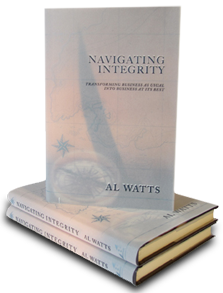After a few decades, Bowling Green State University recently readmitted me for completion of my master’s degree in Organization Development; the degree will be official this August. (No excuses, but somehow I never got around to finishing my thesis long ago after two job changes, a divorce, re-marriage, kids and a few moves.) Returning to grad school after many years in the profession has been a rewarding experience, offering more learning opportunities than reflected in BGSU’s course catalog; let me share a few:
Step into the unknown. Whatever the experience, if we haven’t done it before or it’s a little unnerving, give it a go. Visiting a foreign country, learning a new language, trying a new sport or merely altering our routines stretches our minds and capabilities. The mere act of stretching our minds and capabilities with one endeavor increases our ability to do so with others.
Stay fresh. It’s easier, especially at a certain stage in one’s career, to rely on what we’ve learned to that point and what’s worked for us before. When asked for parting words of advice, one of our guest speakers at the last residency, a senior internal OD practitioner, said: “Don’t count on what worked last time working next time;” how true. Even if we aren’t changing, the world around us is. As retired U.S. Army Chief of Staff General Shinseki put it: “If you don’t like change, you’ll like irrelevance even less.”
Age and experience cut both ways. How could everyone attending BGSU now be so much younger than when I first attended? Of course they are not; after a while I guess our minds just play tricks on us. I’d like to think that after a few years in this business I can offer lessons learned and some wisdom. At the same time, if I am not open to the different perspectives and skill sets that another generation and those in different career stages offer, I’ll miss the boat. I am regularly impressed by class project team mates who see things with new eyes, introduce fresh thinking or methods and suggest better approaches than I would think of on my own.
Humility helps. Age and experience can be a disadvantage if accompanied by the assumption that we should know it all by now, or that others will think that we should. Giving ourselves permission to say “I don’t know,” “I forgot,” “That’s new for me; thank you,” or “I don’t understand” is genuine and opens the door to learning; it will contribute rather than distract from our credibility.
Make friends with technology. I thought I was getting pretty good using technology for work; restarting at BGSU was an awakening. BGSU’s Master’s in Organization Development is a blended program, with two full weekend residencies per class and the balance online. That required new software, applications and climbing a steep learning curve. I’m grateful that it all seems second nature for class teammates and for their patience as I get up to speed. I am not only completing my Master’s in OD, but receiving a secondary education in the technology that increasingly affects all of our work.
Sometimes it’s not just what we sign up to learn, but what we need to learn to get there that pays dividends. Just as becoming a proficient sailor required learning about weather, navigation and mechanical repairs, those secondary learning opportunities yield additional benefits.
Be open and be curious. It’s true that “when the student is ready the teacher will appear.” Much of that readiness involves the ability to set aside, at least for a time, what we thought to be true before. Any new learning is often accompanied by some unlearning, or at least understanding that an answer can be “both / and” instead of “either / or.” I’ve been aware a few times upon returning to BGSU that what I thought to be true, or the way I was accustomed to thinking about things, got in the way of understanding new concepts or learning new methods.
It’s an adventure! I always liked the definition that I heard for “adventure: An experience where outcomes are uncertain but the possibility of great rewards exists.” Beyond the outcome of receiving my graduate degree, I am already seeing new possibilities and new opportunities that I couldn’t have foreseen unless willing to venture some into the unknown. Any worthwhile adventure involves some element of risk and unknowns; those are downpayments. And there are more investments required: money, time, opportunity costs and inconvenience to name a few. That brings to mind another truism: “An inconvenience is an adventure wrongly understood; an adventure is an inconvenience rightly understood.” “No pain, no gain” as they say.
I hope that these observations are useful for you on your own learning journey, whether or not that involves formal education. What form our learning journey takes is likely not as important as our mindset on the journey.
Let me close with two book recommendations, both of which you can find on the inTEgro’s recommended reading site: “Life Reimagined” by Richard Leider, and “Stepping Stones To Success” by Steve Cady. Both of them are inspirational and practical guides for expanding our horizons and charting new courses, whatever forms they take.
The only person who is educated is the one who has learned how to learn and change.
Carl Rogers
An education isn’t how much you have committed to memory, or even how much you know. It’s being able to differentiate between what you know and what you don’t.
Anatole France






